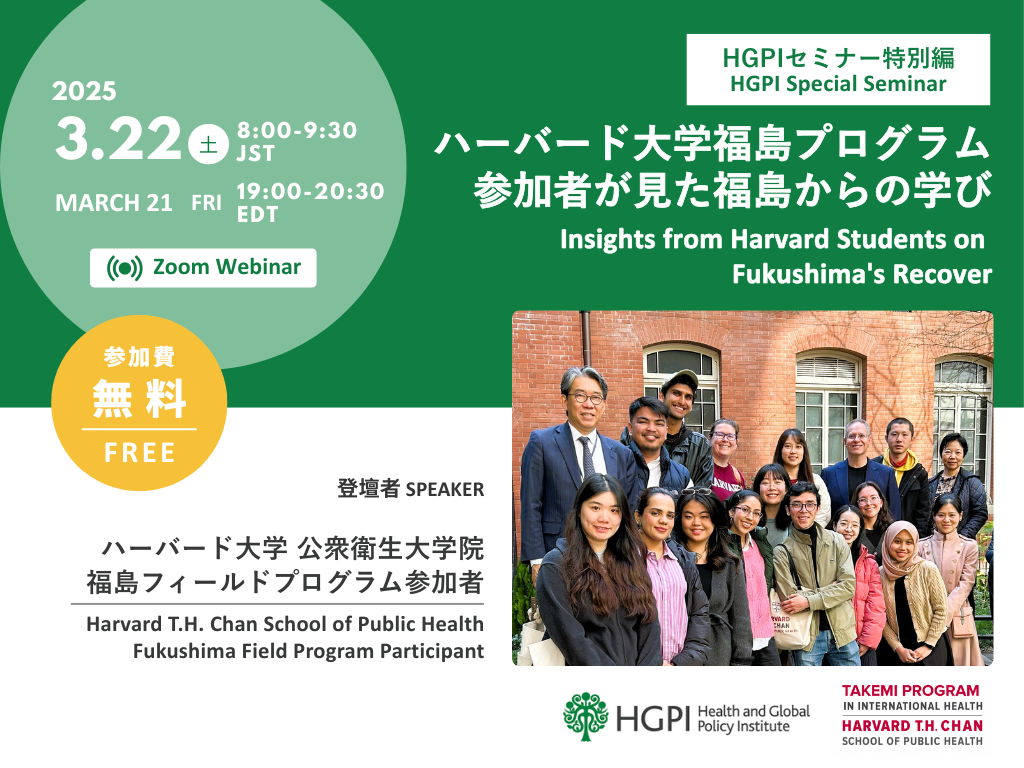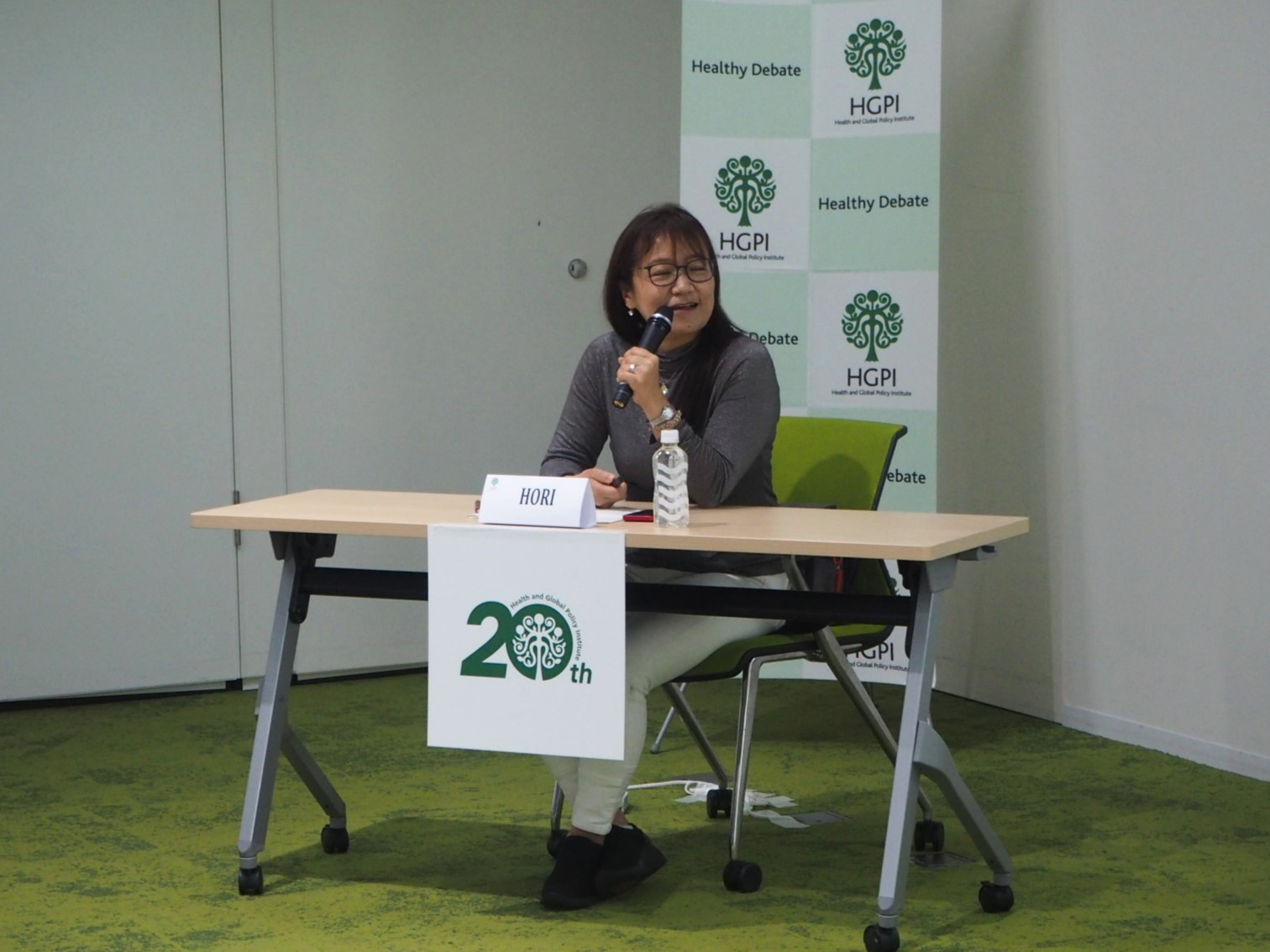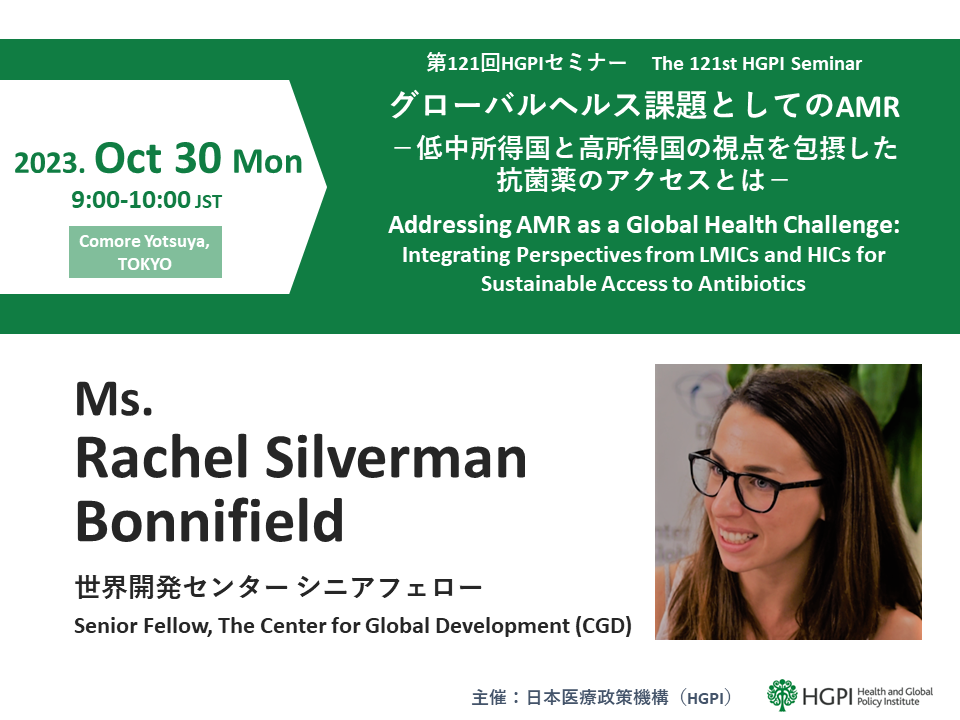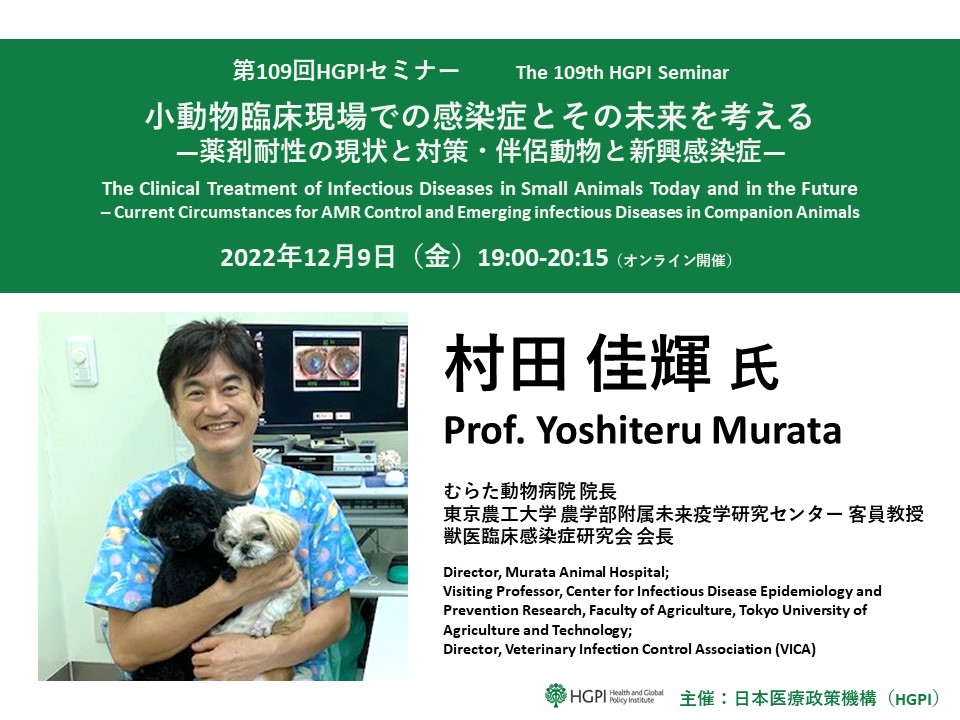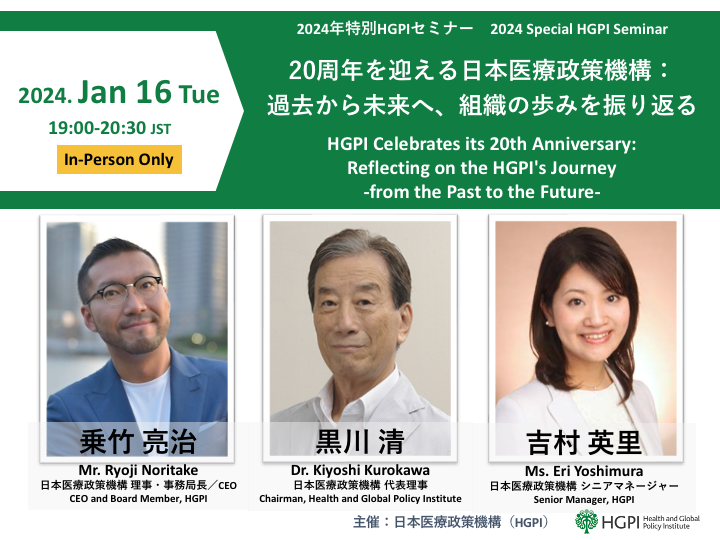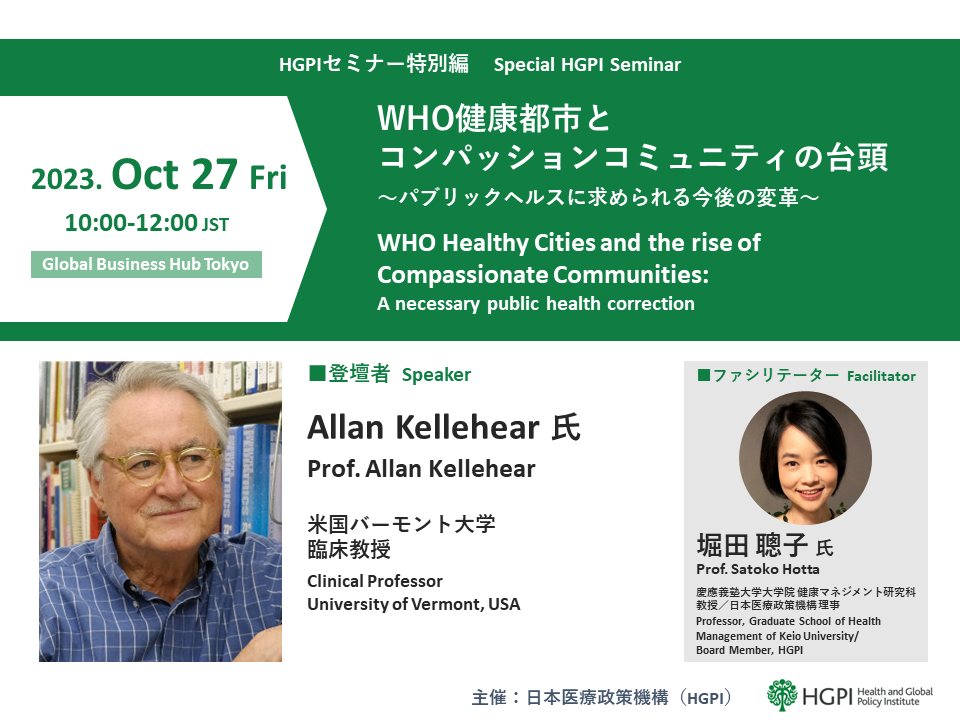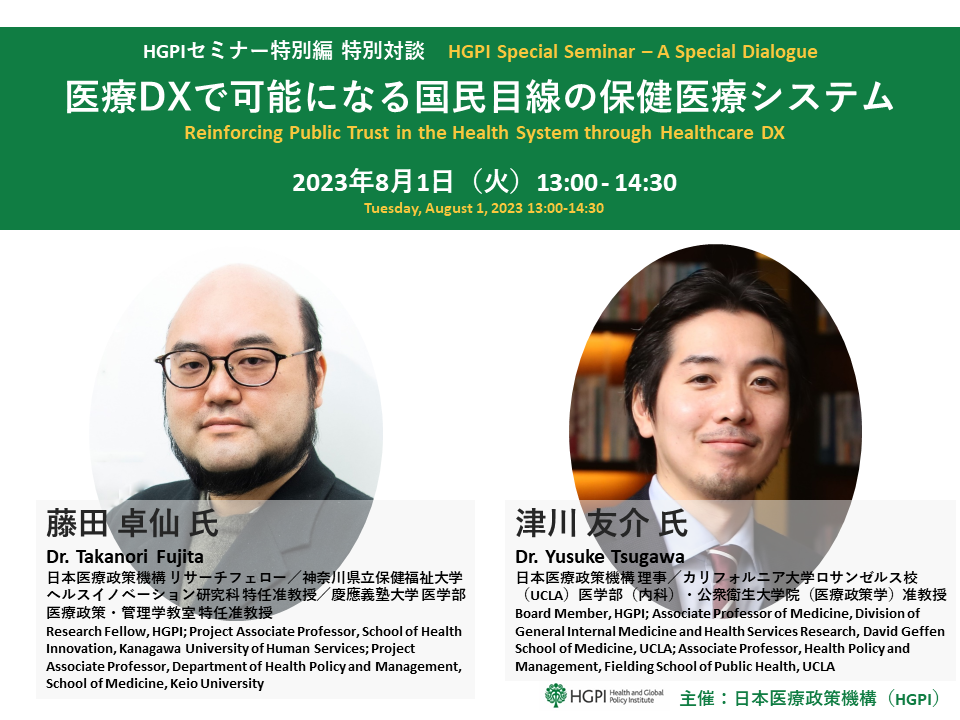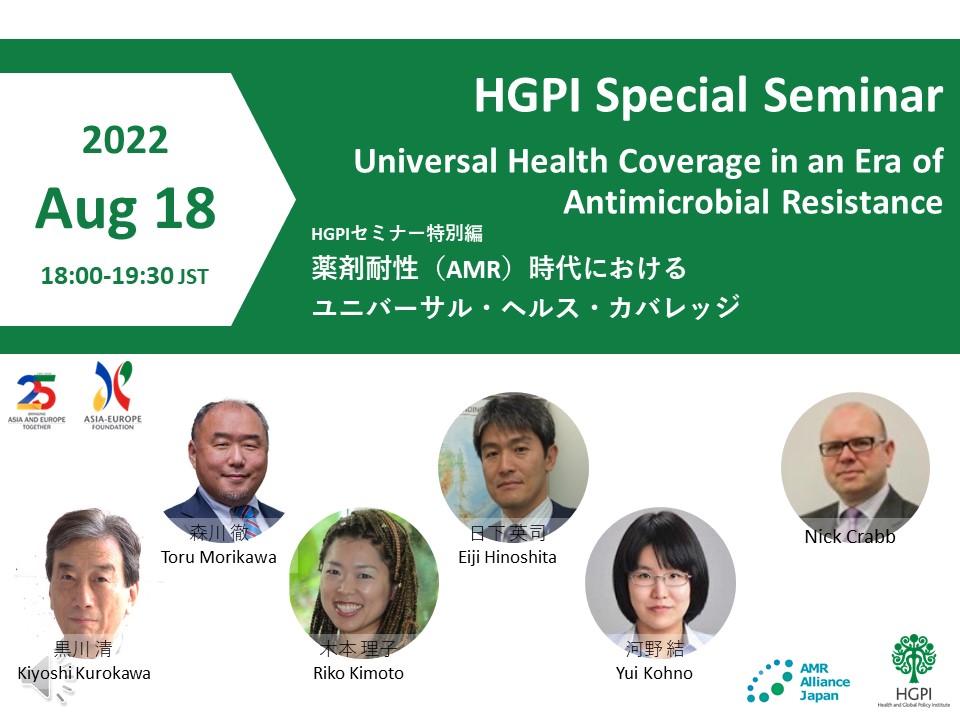[Event Report] HGPI Special Seminar “The Emerging Threat of Antifungal Resistance—Considering Infectious Diseases Caused by Mold and Measures to Combat Drug Resistance” (August 23, 2024)
date : 3/18/2025
Tags: AMR, HGPI Seminar
![[Event Report] HGPI Special Seminar “The Emerging Threat of Antifungal Resistance—Considering Infectious Diseases Caused by Mold and Measures to Combat Drug Resistance” (August 23, 2024)](https://hgpi.org/en/wp-content/uploads/sites/2/HGPI_240719_HGPISeminar_AMR_Eyecatch_REV2-1.png)
For this HGPI Special Seminar, we hosted Professor Koichi Makimura (Deputy Director, Institute of Medical Mycology Professor; Vice-Director, Teikyo University), Dr. Yoshitsugu Miyazaki (Director-General, Department of Fungal Infection, National Institute of Infectious Diseases; Director, Leprosy Research Center, National Institute of Infectious Diseases), and Professor Yuka Yamagishi (Professor, Department of Clinical Infectious Diseases, Kochi Medical School), who shared the latest information on antifungal resistance and discussed issues in this area.
<POINTS>
- Among fungi that have acquired antimicrobial resistance (AMR), Candida auris (C. auris) has become a significant global threat and a priority pathogen for the World Health Organization (WHO) and the U.S. Centers for Disease Control and Prevention (CDC). Japan must introduce measures to prepare for the introduction of strains of C. auris originating overseas or the emergence of resistance in domestic strains.
- Diagnosing and treating mycoses requires specialized knowledge and experience, and developing human resources to provide these services is urgent. Programs to educate health professionals on mycoses must be established and activities from antifungal stewardship support teams must be strengthened.
- In addition to healthcare professionals, citizens also require a full understanding of the need for fungal infection control. While providing microbiology education during and after primary education and reviewing the distribution of microbiological research funding, long-term efforts that aim to rebuild infectious disease control and microbiological research as a national infrastructure will also be important.
Lecture 1: Candida auris: A multidrug-resistant fungal pathogen and a new global threat
Koichi Makimura (Deputy Director, Institute of Medical Mycology Professor; Vice-Director, Teikyo University)
The biological characteristics of fungal pathogens make the development of therapeutics difficult, and in recent years, deaths from mycoses have been increasing
“Fungi” refers to a broad group of organisms that includes molds, yeasts, and mushrooms. As organisms, they possess certain unique characteristics. In terms of their lineage and relationships to other organisms, fungi are more closely related to mammals and other animals than bacteria and viruses, and they have cellular structures similar to humans. These similarities make it difficult to develop specific diagnostic markers that distinguish between human cells and fungi and identify only fungi, which further complicates efforts to develop antifungals, testing equipment, and antifungal reagents.
Harmful varieties of fungi are called “pathogenic fungi” and can weaken the immune system, harm the body, or cause diseases called “fungal infections” or “mycoses.” Mycoses caused by pathogenic fungi are classified by the parts of the body they infect and generally fall into one of two categories: superficial mycoses, which include skin conditions like athlete’s foot; or deep mycoses, which can cause symptoms that affect the organs and include infections like mucormycosis and candidiasis. Deep mycoses in particular are said to carry a high risk of serious, life-threatening medical conditions. Certain people are highly vulnerable to deep mycoses, such as those with weakened immune systems or in poor general condition. These include people undergoing organ transplantation, chemotherapy, or immunosuppressive therapy for autoimmune diseases.
The prevalence of deep mycoses is on the rise in Japan. In 1970 and earlier, deep mycoses were found in only about 1% of pathological autopsies performed in Japan, but by 2013, this figure had increased to 5.1%. In other words, over 1 in 20 deaths are caused by deep mycoses. Japan must overcome the difficulties rooted in the biological characteristics of fungi, make further progress in developing antifungals, and continue establishing mycoses treatment guidelines.
As shown by examples from overseas, outbreaks of a species named Candida auris (C. auris) are extremely difficult to effectively control due to its characteristics like long-term persistence in the environment, airborne transmission, and disinfectant resistance
While deep mycoses are generally treatable with antifungals, the emergence of fungi that have acquired antifungal resistance in recent years has become a global problem. There is particular concern about Candida auris, or C. auris, which was identified as a new species in a 2009 report from Japan.
The most common causes of deep mycoses are four genera of fungi: Candida, Aspergillus, Cryptococcus, and Mucor. Among the many types of fungi found in nature, these groups can cause opportunistic mycoses because they meet two conditions: they grow at around 37°C and they can use human tissue as their sole source of nutrition. However, C. auris can grow at temperatures as high as 42°C, is more virulent, and tends to have multidrug resistance.
There are currently six known genotypes or clades of C. auris. Among them, clades I, III, and IV are outbreak strains, and infections caused by these strains have been reported around the world. These strains originated outside of Japan and can cause bloodstream infections. Over 90% of them have resistance to fluconazole, while around 40% have resistance to two or more antifungals. The strain of C. auris that was reported in Japan – the domestic strain – is clade II. It is most commonly isolated from the ear and has low virulence.
Clade I C. auris was detected in Japan at the end of 2021. Even today, in August 2024, most cases of C. auris detected in Japan belong to clade II, the domestic strain, but in response to the detection of a clade I outbreak strain from overseas, the Ministry of Health, Labour and Welfare (MHLW) issued an administrative circular (titled, “Information and request regarding multidrug-resistant Candida auris (C. auris), which can cause serious infections”) and countermeasures are now being strengthened.
C. auris can survive in the environment for extended periods, be transmitted through airborne routes, and have resistance to disinfectants. Given these characteristics, nosocomial outbreaks can be extremely difficult to control once they occur. When attempting to do so, in addition to culture identification and susceptibility testing, genetic testing is also important. If C. auris is detected, colonized or infected patients must be isolated in private rooms or in separate areas to the greatest extent possible, and they must be provided with information and appropriate treatment. Furthermore, to prevent the introduction of strains from abroad, it is also necessary to pay close attention to people who stayed in healthcare facilities overseas, such as inbound medical tourists.
It is urgent we address outbreaks of C. auris and other mycoses as well as antifungal resistance, and insufficient research funding and human resource development are among the greatest challenges
According to a report from the World Health Organization (WHO), fungal infections receive less than 1.5% of all funding for infectious disease research. In addition, the number of researchers in this field in Japan is on the decline, so human resource development is an urgent issue. Japan is a hot and humid country, which puts its citizens at high risk for outbreaks of fungal infections. Based on a recognition that fostering interest in fungi among all citizens and developing specialists will be vital for Japan as a whole as well as internationally, I would like to recommend five actions for countermeasures in the future:
- Japan needs to rebuild infectious disease control and microbiology research as a national infrastructure
- Research funds must be increased and concentrated on developing new antifungals and improving diagnostic methods
- Japan must develop human resources for medical mycology education and research
- Japan must secure and maintain domestic reference and consultation services for mycoses and pathogenic fungi
- Education on fungi and microbiology provided from primary and middle school to higher education must be expanded and microbial literacy among citizens must be improved
There is growing recognition of mycoses as an emerging threat, particularly for species with antifungal resistance. As shown by the example of C. auris, the emergence of new species or the acquisition of antifungal resistance in a known species cause major problems in real-world clinical settings. As the priority of fungal infection control within overall infectious disease control is likely to increase in the future, continuous efforts to combat mycoses and antifungal resistance will be all the more necessary.
Lecture 2: Domestic trends in epidemiology and antifungal resistance for C. auris, a new fungus
Yoshitsugu Miyazaki (Director-General, Department of Fungal Infection, National Institute of Infectious Diseases; Director, Leprosy Research Center, National Institute of Infectious Diseases)
C. auris warrants a global response, and Japan has started taking action by introducing nationwide surveillance and developing an infection control manual
The international community has come to recognize C. auris as a major issue in the years since it was first identified in Japan in 2009. For example, the WHO assigned it the highest priority in its 2022 Fungal Priority Pathogens List, which included C. auris in the “Critical Priority Group.” In the 2019 Antibiotic Resistance Threats Report from the U.S. Centers for Disease Control and Prevention (CDC), which corresponds to the CDC’s Priority Pathogens List (PPL), C. auris is designated as one of the most threatening pathogens and is included among “Urgent Threats.” This is the same designation as carbapenem-resistant Enterobacteriaceae (CRE), which has been dubbed the “nightmare bacteria.”
Given these developments, to grasp circumstances in Japan, the MHLW issued a request in May 2023 that asked local governments to report suspected cases or antifungal-resistant strains of C. auris. In response, the National Institute of Infectious Diseases (NIID) re-identified strains collected from throughout the country on which they conducted susceptibility testing and confirmed genotypes (clades).
According to NIID surveillance findings, among 55 samples that were collected, 11 were identified as C. auris. While most of those samples were isolated from the ear (like when C. auris was first identified in Japan), some were isolated from sputum and bronchoalveolar lavage fluid. After genotyping, only one sample was suspected to be clade I (the strain originating overseas) while the rest were all clade II (the domestic strain). Drug susceptibility testing found that based on CDC criteria, nine samples had resistance to fluconazole but not to other antifungals.
These findings confirmed that the predominant strain in Japan is clade II, just as it had been in the past, and that strains with antifungal resistance have yet to be detected. However, because clade I strains have been detected in ear isolates, it will be important to pay close attention to strains isolated from the ear and with the potential to cause serious outbreaks. In light of the fact that strains from other clades or with antifungal resistance may be brought into Japan as inbound medical tourism increases, it will also be important for there to be continuous monitoring and surveillance of C. auris.
Proactive C. auris surveillance efforts in the U.S. and U.K. have led to the detection of clinical cases. In Japan, on the other hand, the Act on the Prevention of Infectious Diseases contains no provisions for such surveillance, and information is only gathered under notifications issued by the MHLW, as mentioned above. Also, while screening is generally not conducted in Japan, screening in other countries is conducted when necessary by collecting inguinal skin swabs. In the area of nosocomial infection control, the National Center for Global Health and Medicine, NIID, and the MHLW compiled the “Clinical and Nosocomial Infection Control Manual for Candida auris” in 2023, and efforts to implement countermeasures are steadily advancing.
Despite unique challenges for C. auris in terms of testing and diagnosis, treatment, infection control, surveillance, and human resource development, we must implement comprehensive and strategic measures for C. auris as part of AMR control
There are many reasons C. auris is recognized as a problem, but I would like to share issues and measures in terms of five aspects: testing and diagnosis, treatment, infection control, surveillance, and human resource development.
In terms of testing and diagnosis, the main challenge is the high possibility of misidentifying C. auris as another species. The biochemical properties or biological characteristics of C. auris can make it difficult to accurately identify when screening with blood cultures and other conventional methods of detection. These are considered unreliable due to the high possibility of species misidentification or false negatives on culture tests. This means definitive diagnoses must be performed with state-of-the-art mass spectrometry devices or genetic testing, but not all facilities are equipped to do so. Even in areas with regional health laboratories, only a limited number of facilities have the cutting-edge testing devices or the equipment to perform whole genome analysis, so it will be necessary to establish a system that enables collaboration among each health facility and NIID or with research facilities with ample experience.
Next, in terms of treatment, C. auris has a high rate of resistance and antifungals needed to treat it can be difficult to obtain. Reports show that over 90% of strains isolated overseas have resistance to the common antifungal fluconazole, and about 40% of strains have resistance to two or more antifungals. While there has been progress in the development of novel antifungals like glucan synthase inhibitors or GPI inhibitors, they have yet to become widespread and are still difficult to obtain. Another issue is that it will take time before they can be used for general treatment.
As for infection control, one challenge is that even among fungi, C. auris is particularly hardy and can survive in the environment for long periods of time. In clinical settings, it is difficult to achieve complete eradication once C. auris has been detected in a patient’s room. Overseas, infection control is extremely difficult even for major hospitals with advanced isolation facilities. In some cases, strains of the same genotype can still be detected several months after an outbreak, which means those facilities must conduct ongoing surveillance.
Another challenge is strengthening Japan’s surveillance system on a nationwide scale. Other countries like the U.S. and the U.K. have started to conduct active screening that includes tracking the total number of cases or clinical cases. Japan’s current system is limited to collecting information that is submitted voluntarily in accordance with notifications from the MHLW. In addition to further examining the effectiveness and feasibility of this system, in the future, we should also consider tracking the total number of cases based on the Act on the Prevention of Infectious Diseases and actively conducting surveys that include clinical cases. While C. auris is not a major problem in Japan at the moment, given its characteristics, an outbreak is very likely to be difficult to control should one occur. This means it will be important to introduce preventive measures and to establish a system with rapid response capacity. While preparations on measures similar to those in Europe and the U.S. are currently underway at related academic societies and the MHLW, moving forward, we will require concerted efforts from health institutions, testing institutions, and the Government.
Finally, I would like to emphasize the importance of developing and securing human resources. Even when in-house laboratories at hospitals and other facilities have genetic testing devices, there are too few personnel who can properly operate them in clinical settings. The aforementioned difficulty of accurately identifying fungi is precisely why it is so urgent we train and secure personnel that are proficient in testing. It will also be vital to promote research on fungal infections, especially for C. auris. We must train and support researchers in a wide range of fields spanning basic research to clinical research so they can handle various duties like developing new antifungals, establishing and disseminating more rapid and accurate diagnostic methods, and developing effective methods of environmental decontamination.
However, instead of advancing siloed measures for C. auris control, those measures should be incorporated as part of AMR control. While leveraging knowledge on AMR control that has been accumulated through past efforts, we must establish comprehensive and strategic AMR countermeasures that can also address issues that are unique to fungi. An essential part of this will be an interdisciplinary approach that involves specialists in various fields including bacteriology, mycology, infectious disease, and public health.
Lecture 3: Place antifungal stewardship at the heart of fungal infection control
Yuka Yamagishi (Professor, Department of Clinical Infectious Diseases, Kochi Medical School)
The arrival of new treatment options for fungal infections is driving a shift in priority pathogens in fungal infection control, making early detection and diagnosis or appropriate disease management essential
As medical science has advanced, fungal infections have been on the rise. It is believed that progress in transplantation medicine and chemotherapy has increased the number of patients who are at high risk of fungal infection due to factors like impaired immunity or poor general condition. In fact, annual pathological autopsy data from Japan shows an increase in the frequency of fungal infections, especially in the 1970s and 1980s. While candidiasis and aspergillosis have always been the most common infections, aspergillosis has been increasing since 2000. When we look at the fiscal year each antifungal entered the market, we see that several have been launched since 2000, so treatment options also increased over the same period.
In addition to bacteria, the CDC and WHO are also paying attention to fungi, and the WHO has published a list of pathogens that pose a threat to humanity called the Fungal Priority Pathogens List. It emphasizes the importance of implementing measures for the Candida and Aspergillus groups. In particular, it assigns the highest priority to C. auris and Candida albicans in the Candida group and Aspergillus fumigatus in the Aspergillus group.
Among deep mycoses, candidiasis is one of the most familiar as well as most invasive infections. It is caused by Candida fungi that are normally found in the gastrointestinal tract and on the skin. These fungi invade the bloodstream during immunosuppression or after medical procedures, causing candidemia. Candidemia can spread to various organs and cause serious infections, so it is vital that early diagnosis and appropriate treatment are provided. According to an MHLW report, a growing number of Candida species have been detected in Japan in recent years, but these do not include Candida albicans, which the WHO recognizes as the most dangerous. Among the other species that pose problems for Japan, there are concerns that antifungal-resistant strains of pathogens like Candida glabrata and Candida parapsilosis may emerge. The most frequently detected Aspergillus species is Aspergillus fumigatus, and the increase in strains of Aspergillus fumigatus with azole resistance has become an issue around the world.
A survey on invasive fungal infection (IFI) testing in the Asia-Pacific region found that the people at highest risk for IFI tended to be those infected with COVID-19 or – as has been pointed out in the past – those under immunosuppression. New fungal infections associated with COVID-19 that have attracted attention include COVID-19-associated pulmonary aspergillosis (CAPA), COVID-19-associated mucormycosis, and COVID-19-associated invasive candidiasis. These conditions are factors associated with poor prognosis and are particularly problematic in people with severe cases of COVID-19. In addition, a mycoses study conducted by cancer research institutes overseas reported that the use of T-cell or B-cell immunosuppressants are risk factors for invasive respiratory fungal diseases. These findings show that in addition to securing health systems that can provide diagnosis and treatment for underlying conditions, it is also necessary to provide appropriate disease management for the early detection and diagnosis of fungal infections concomitant with underlying diseases.
Expectations are high for mycoses countermeasures like bundling diagnosis and treatment, supporting antifungal stewardship, developing new antifungals, collecting and analyzing epidemiological data, and raising awareness and providing educational support to citizens
Key initiatives for antifungal stewardship include bundling diagnosis and treatment and efforts from Antimicrobial Stewardship (AS) support teams. Bundling is a method in which multiple methods of infection control that are considered particularly useful are implemented together, and in which treatments are generally selected automatically using checklists prepared by academic societies or similar organizations. AS teams include multidisciplinary staff such as physicians, pharmacists, laboratory technicians, nurses, and administrative staff, and they work together with attending physicians while providing the necessary Diagnostic Stewardship (DS). Specifically, this includes selecting antifungals, optimizing dosages and durations, confirming drug interactions, and monitoring the effectiveness of treatments. Promoting AS is likely to improve patient prognoses, optimize antifungal use and cost, and shorten hospital stays. AS teams are also important from the perspective of human resource development, and using guidelines and examining case studies as part of their activities will help foster the next generation of experts.
To respond to the emergence of antifungal-resistant fungi, developing new antifungals is a vital and global issue. Several new compounds are currently undergoing clinical trials and will expand treatment options once they reach the market. Efforts to develop new antifungals are also underway in Japan, where drugs with different mechanisms of action than existing drugs or with broad-spectrum properties are currently undergoing clinical trials. However, developing new drugs takes a long time, so we must minimize the emergence of antifungal-resistant strains through stewardship of existing antifungals.
As it will also be important to gather and analyze epidemiological data, efforts to establish a nationwide surveillance system are currently underway. Such a system will help us track mycosis outbreaks and antifungal resistance, and that information can then be used to formulate appropriate strategies.
We must continue improving understanding and spreading awareness of mycoses. For example, we might introduce domestic initiatives similar to the CDC’s “Fungal Disease Awareness Week,” which takes place every year in mid-September. In addition to informing healthcare professionals on fungal infection control, I would like for us to also convey its importance to citizens for the prevention, early detection, and early treatment of fungal infections.
[Event Overview]
- Speakers:
Prof. Koichi Makimura (Deputy Director, Institute of Medical Mycology Professor; Vice-Director, Teikyo University)
Dr. Yoshitsugu Miyazaki (Director-General, Department of Fungal Infection, National Institute of Infectious Diseases; Director, Leprosy Research Center, National Institute of Infectious Diseases)
Prof. Yuka Yamagishi (Professor, Department of Clinical Infectious Diseases, Kochi Medical School) - Date & Time: Friday, August 23,2024; 18:00 – 19:30 JST
- Format: Online (Zoom webinar)(Not available for recording)
*The presentation slides and edited recording will be shared with individual supporting members only at a later date.
- Language: Japanese
- Participation Fee: Free
- Capacity: 500 participants
■Profiles:
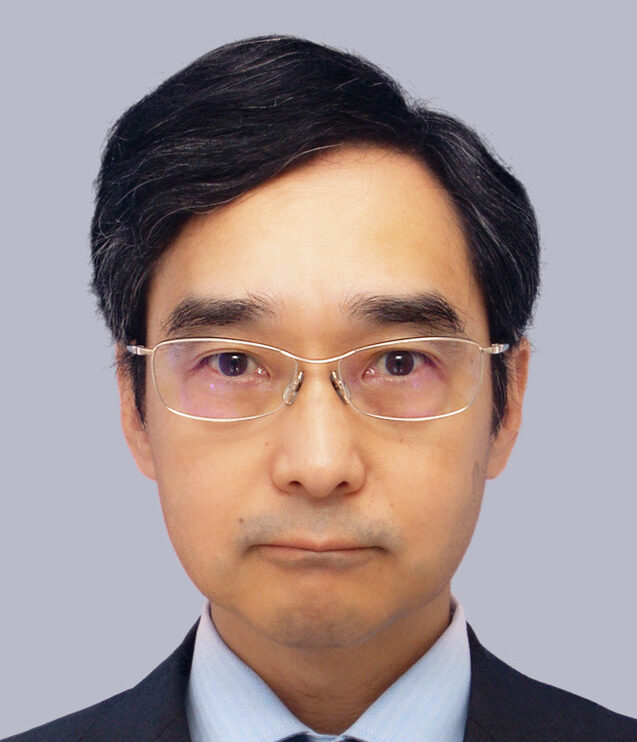 Prof. Koichi Makimura (Deputy Director, Institute of Medical Mycology Professor; Vice-Director, Teikyo University)
Prof. Koichi Makimura (Deputy Director, Institute of Medical Mycology Professor; Vice-Director, Teikyo University)
Dr. Koichi Makimura MD PhD graduated from Tokyo Medical University (1990) and completed postgraduate studies at Teikyo University. After a fellowship at Tampa Bay Research Institute (1992), he joined Teikyo University Institute of Medical Mycology in 1994. He became a professor in 2011 and Vice Director of the Center in 2021. Notably, he served as the principal investigator for microbiology research in the Japanese Experiment Module of the International Space Station. His research focuses on fungi affecting human health, spanning environments from hospitals to zoos and ancient ruins. Dr. MAKIMURA continues to contribute to all aspects of medical mycology.
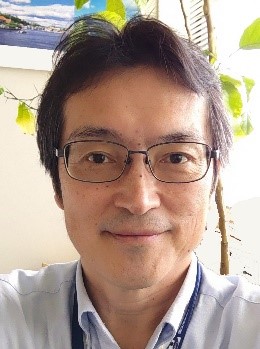 Dr. Yoshitsugu Miyazaki (Director-General, Department of Fungal Infection, National Institute of Infectious Diseases; Director, Leprosy Research Center, National Institute of Infectious Diseases)
Dr. Yoshitsugu Miyazaki (Director-General, Department of Fungal Infection, National Institute of Infectious Diseases; Director, Leprosy Research Center, National Institute of Infectious Diseases)
Dr. Yoshitsugu Miyazaki is an expert in internal medicine, particularly infectious diseases, medical mycology, and respiratory medicine. He was appointed as the Director-General of the Department of Fungal Infection since its establishment at the National Institute of Infectious Diseases (NIID) in 2013. He has been concurrently serving as Director of the Leprosy Research Center at NIID since 2019. He also serves as a member of the Pharmaceutical Affairs Council of the Ministry of Health, Labour, and Welfare’s Medical Device and Regenerative Medicine Product Safety Committee.
Dr. Miyazaki joined NIID as Director-General of the Department of Chemotherapy and Mycosis in 2007. Before joining NIID, he was a lecturer in the Department of Laboratory Medicine and the Second Department of Internal Medicine at Nagasaki University Hospital. In 1995 he was a fellow in the National Institutes of Health (NIH) in the United States. In 1994 he worked at the Imari Municipal Hospital.
Dr. Miyazaki graduated from Nagasaki University School of Medicine in 1988. He also has a PhD in Medicine from Nagasaki University.
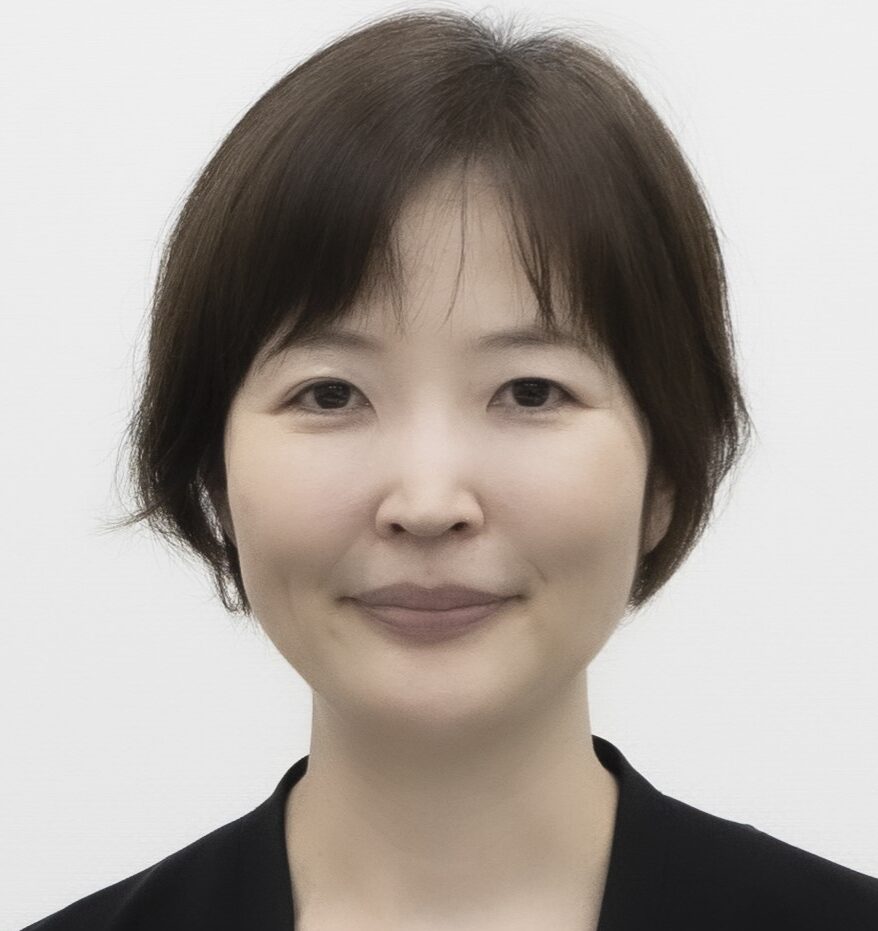 Prof. Yuka Yamagishi (Professor, Department of Clinical Infectious Diseases, Kochi Medical School)
Prof. Yuka Yamagishi (Professor, Department of Clinical Infectious Diseases, Kochi Medical School)
Prof. Yuka Yamagishi, MD, PhD, graduated from Juntendo University Faculty of Medicine and trained as a pediatrician at Gifu University Hospital and in the Department of Infection Control and Prevention at Aichi Medical University Hospital. Before joining Kochi University, she was an associate professor (2016) and a professor (April 2017) of the Clinical Infectious Diseases Program in the Graduate School of Medicine at Aichi Medical University. Dr. Yamagishi became a professor of Infectious Diseases and the Director of Infection Control, Kochi Medical School Hospital on July 2021, and has also served as a professor in the Department of Clinical Infectious Diseases at Kochi Medical School since 2022.
Dr. Yamagishi’s qualifications include certified clinical laboratory physician of the Japanese Society of Laboratory Medicine, board certified pediatrician and board certified supervisor of pediatrics. She is also an infectious disease specialist and consultant of the Japanese Association for Infectious Diseases. Dr. Yamagishi is active in several associations; she serves as a board member of the Japan Society of Chemotherapy, the Japanese Society for Medical Mycology, the Japanese Society for Sexually Transmitted Infections, and the Japan Society of Surgical Infection.
Top Research & Recommendations Posts
- [Research Report] Perceptions, Knowledge, Actions and Perspectives of Healthcare Organizations in Japan in Relation to Climate Change and Health: A Cross-Sectional Study (November 13, 2025)
- [Research Report] The 2025 Public Opinion Survey on Healthcare in Japan (March 17, 2025)
- [Policy Recommendations] Reshaping Japan’s Immunization Policy for Life Course Coverage and Vaccine Equity: Challenges and Prospects for an Era of Prevention and Health Promotion (April 25, 2025)
- [Research Report] AMR Policy Update #4: Cancer Care and AMR (Part 1)
- [Research Report] The 2026 Public Opinion Survey on Healthcare in Japan (February 13, 2026)
- [Policy Recommendations] The Path to a Sustainable Healthcare System: Three Key Objectives for Public Deliberation (January 22, 2026)
- [Research Report] The 2023 Public Opinion Survey on Satisfaction in Healthcare in Japan and Healthcare Applications of Generative AI (January 11, 2024)
- [Research Report] Building a Mental Health Program for Children and Measuring its Effectiveness (June 16, 2022)
- [Policy Recommendations] Developing a National Health and Climate Strategy for Japan (June 26, 2024)
- [Policy Recommendations] Mental Health Project: Recommendations on Three Issues in the Area of Mental Health (July 4, 2025)
Featured Posts
-
2026-01-09
[Registration Open] (Hybrid Format) Dementia Project FY2025 Initiative Concluding Symposium “The Future of Dementia Policy Surrounding Families and Others Who Care for People with Dementia” (March 9, 2026)
![[Registration Open] (Hybrid Format) Dementia Project FY2025 Initiative Concluding Symposium “The Future of Dementia Policy Surrounding Families and Others Who Care for People with Dementia” (March 9, 2026)](https://hgpi.org/en/wp-content/uploads/sites/2/dementia-20260309-top.png)
-
2026-02-05
[Registration Open] (Webinar) The 141st HGPI Seminar “Current Status and Future Prospects of Korea’s Obesity Policy: Voices of People with Lived Experience in Policy Promotion” (March 3, 2026)
![[Registration Open] (Webinar) The 141st HGPI Seminar “Current Status and Future Prospects of Korea’s Obesity Policy: Voices of People with Lived Experience in Policy Promotion” (March 3, 2026)](https://hgpi.org/en/wp-content/uploads/sites/2/hs141-top-1.png)
-
2026-02-27
[Registration Open] (Webinar) The 142nd HGPI Seminar “World Kidney Day 2026” Theme in Focus: The Current State of Green Nephrology and Green Dialysis—Balancing Kidney Health and Planetary Health (March 10, 2026)
![[Registration Open] (Webinar) The 142nd HGPI Seminar “World Kidney Day 2026” Theme in Focus: The Current State of Green Nephrology and Green Dialysis—Balancing Kidney Health and Planetary Health (March 10, 2026)](https://hgpi.org/en/wp-content/uploads/sites/2/The142nd_HGPI_Seminar.jpg)






